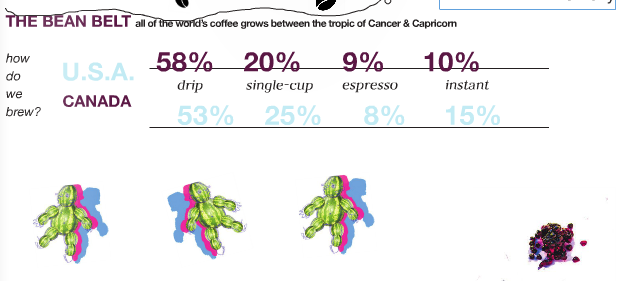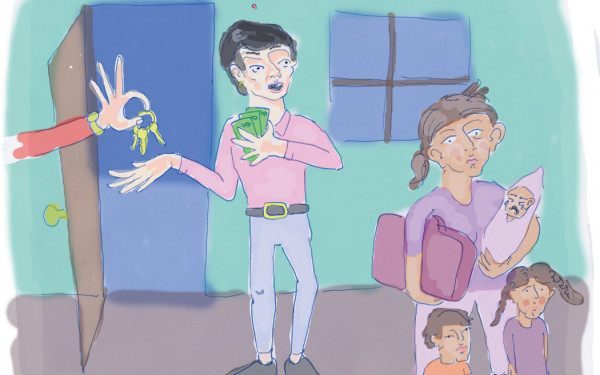Bean Me, Cleanly
Montreal Hops Aboard the Third Wave Coffee Movement
Coffee has become Canada’s fuel. Every day approximately 65% of adult Canadians consume coffee, according to the Coffee Association of Canada.
Coffee has become Canada’s fuel. In the last day, approximately 65% of adult Canadians have consumed coffee, according to the Coffee Association of Canada. Whether it be to provide a caffeine boost before an early morning class or to stay awake due to a late night crunch, it’s clear to say that Canadians enjoy this beverage. With so, it is no coincidence that coffee happens to be the 2nd most traded commodity in the world. But how much do you know about what is inside your cup of joe?
Coffee is mainly produced in the Southern hemisphere, in the latitudes between the Tropic of Cancer and Capricorn, known as the Bean Belt. Over the last decade, views on coffee have been reconfigured, particularly with the emergence of the third wave movement, an initiative that focuses on a producing high-quality coffee. Distinctive features of this wave include partaking direct or fair trade relations with farmers, with intentions of producing high-quality beans that meet the standards of specialty coffee (scoring 80 points on a scale of 100 point-scale). These new practices involve improvements at all stages of production but most importantly, better standards for small farm producers.
Brulerie Santropol, a local Montreal coffee roaster and distributor since 2000, has been one of the first adherents to importing, roasting as well as distributing fair trade and organic coffee, while empowering local and small-scale producers who sustain our coffee addiction. They currently distribute their coffee to Concordia’s student-run café, the Hive.
“When officially ‘fair trade’ certified coffee first became available in Québec, our history and reputation led to the Santropol to be the first café to offer it in Montréal. […] we then decided to try to import and roast fair trade certified coffee ourselves. For myself, it has always been the ‘fair trade’ aspect of this business, and the direct contact with southern producers, which has appealed to me most, which gives meaning to what I’m doing” explained James Solkin, director of business development at Brulerie Santropol.
Fair trade is an organized social movement whose motivations are to help producers in developing countries to regulate better trading conditions and promote sustainability. Their goals are to advocate higher social and environmental standards while charging higher prices to exporters.
“Fair Trade Canada, a national initiative associated with Fair Trade International, employs and requires strict objective third-party inspection and verification that standards are being respected. Fair trade certification systems, which are impartially, objectively and verifiably certified by an objective third party are the exception to the rule .” said Solkin. “Many large companies which declare that they employ fair trade practices are ‘self-certified’ and claim to respect general standards, but this cannot be confirmed by any outside parties.”
Although, in recent developments conventional, ‘mainstream’ fair trade has among consumers, undermined its credibility and legitimacy because they have not respected their original missions, by attracting multinational corporations and privately-owned land owners who’ve obtained certifications while refusing to improve social standards for farmers. Transnational corporations have caused massive unemployment and led to unregulated trading activities and environmental disasters, while empowering a small nucleus of economic and political entities.
“Everyone knows by now that our mainstream economic model represents a recipe for global political and environmental disaster,” James Solkin
“Conventional fair trade is now being independently redesigned and relaunched in the south by producers themselves. This new initiative is called the ‘Small Producers Symbol’. It is designed to be a real engine for change in both local and global economies, to correct the errors made in conventional fair trade strategies and to return to the original mission and enhance the legitimacy of the movement.” explained Solkin.
“Our company wholeheartedly endorses and is committed to this new initiative. This system is the first fair trade certification in the world to be owned,operated, designed and governed by small farmers in the south. They maintain extraordinarily high standards of transparency in its governance and administration.” added Solkin.
The Small Producers’ Symbol is an initiative that launched in 2006 by the Latin American Caribbean Network of Small Fair Trade Producers in essence to effectively dignify the lives of affiliated producers, families and communities. Constructed along a democratic organization, this allows for all members and sectors to participate in the collective interest. Self-managed by local social groups, it fights against the interference and manipulation of outside interests groups. It adheres for solidarity, justice, equity and transparency.
Its economic basis relies on the fact that producers need dignified living with enough food, adequate health and hygiene conditions as well as provide education, housing and sources of employment to generate income to both rural and urban sectors. Running on small-scale production, this form of labour generates revenue that allows to reinvest in the local economy and enforce direct trade relations between producers and consumers, hence strengthening its structure. Today, many young consumers and coffee shops are expressing interest in these alternative business models.
“From the standpoint of many younger participants in our society who have a lot to contribute [to this change] as they are on the lookout for a legitimate opportunity to make their contribution, either as direct actors or as consumers, […] to rule out ‘market forces’ and lies.” explained Solkin.
The third wave coffee culture has allowed to bridge a gap between consumers and producers, by striving to represent the figures of coffee connoisseurship and sharing their wealth of knowledge. Increasingly, they are attempting to support alternative business models and product certification systems that adhere to positive environmental, labour and developmental standards.
“Third wave and producer-governed fair trade represent alternative efforts to graft human values and ethical, environmentally responsible standards into a truly ‘sustainable’ business model. Both initiatives can operate from the same platform., and thereby mutually enhance their impact, appeal and credibility. These are pioneering visions exemplify some essential features of the alternative, less destructive and brutal economic model which we must build..Everyone knows by now that our mainstream economic model represents a recipe for global, political and environmental disaster.” concluded Solkin.


_600_832_s.png)



_600_375_90_s_c1.jpg)